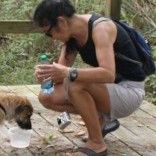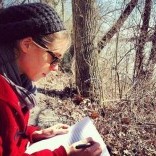Object
Timur Karaca
I found it in the woods behind our new house, the year after my mother died. It was half buried at the foot of an old maple, and when I’d picked it up and broken away some of the dirt and decaying leaves, I could see that it was an intricately wound bundle of string, or yarn, and cloth, about the size of both of my outstretched hands. It looked to have been composed in layers: green string wound carefully on a gray strip of fabric, then wrapped in red wool, and the whole thing bound in purple yarn, then more bindings of twine and pink thread, then white, and so on. It was heavy. I imagined that it must have taken someone a very long time. There were a few tattered stalks or appendages that gave it the appearance of a cloth organ that had been cut out of someone—a heart maybe, though I supposed it could just as easily have been a kidney, or a tumor, or a pancreas. I’d hiked in alone, and there was no one else around, only the wind in the branches and layering clouds. I tucked it inside my coat and walked home.
My mother had died of leukemia. It happened quickly. We understood early that her prognosis was bad, but no matter what anyone tells you, there’s always hope right up until the end. We thought we were looking at years, maybe, not months. We were living in Florida. I was twelve.
“How about a change of scenery, Suz,” my father said one day, a month or so after she died, “a new start?” It was just us. He was lying on his back with his head against the wall, trying to repair our broken air conditioner. I was sitting cross-legged on the carpet, watching him. We’d been living there for my mother’s work. He was a writer. He could have done his job anywhere. He never cared much for the heat, or swamps, or the bugs. But Florida was my home. I’d never lived anywhere else. I knew we wouldn’t move if I said I didn’t want to. But I was afraid that something might happen to him if we didn’t—not just that he would be lonely or depressed, but that he would have an accident, or get sick, that he would die also. He cursed quietly and slapped the side of the machine. He was holding some part of it in his fingers. “How about Vermont?” he said. I told myself that I never really loved Florida anyway, and possibly it was true. I burned easily in the sun. The idea of snow was exotic. There were only two other girls I counted as best friends, and I assumed we were headed for different high schools soon anyway, that we’d be keeping in touch by phone, and that I might as well go ahead and get adulthood under way. My father wiped his face on his shirt. “Sure,” I said, shrugging. He shut the bottom of the air conditioner. It still wasn’t working, but he sat up and smiled. We found a renovated farmhouse adjacent to acres of protected forest. I would have a bigger bedroom. He converted the attic into a study where he could work on his stories and watch the kaleidoscopic seasons change through his window.
Carrying the bundle of cloth and string home through the woods, I wondered who might have left it there. I imagined that it was some wanderer, a woods person who’d come through our forest, an old man, or a child, maybe, younger than me. I imagined that he’d been carrying the bundle with him his whole life, and that each day, or as the occasion warranted, he would add to it, that he would take a piece of string he’d found, or a scrap of cloth or fabric that was meaningful, and wind it in. I wondered why he might have left it behind, or if it had been lost, and if he would come looking for it. I would return it, of course, if he did. But until then, I felt that I should keep it. I couldn’t leave it there, half buried and rotting on the forest floor. And then I wondered what my father would think of it. He might shrug or smirk, ask what I intended to do with it. He might grimace and say that it was junk, or even worry that it was unsafe for some reason. Or, he might take it and want to examine it, pull at the bindings and try to get a look inside, maybe even cut it open. I decided that I couldn’t let him see it.
It was getting dark when I arrived at our house. The light was on in his study. I eased the front door open and shut, but I heard my father upstairs, shifting in his chair, then his steps in the hallway. I carried the bundle to my room and shut the door. My father knocked. “I need privacy,” I said, before I could think of anything else. I heard him hesitate at the door, then walk away. I transferred the bundle to a black velvet drawstring bag I kept in a box of things that I hadn’t yet found a use for. I hid it beneath my bed. Then I scrubbed my hands and face, and I went to join my father for dinner, hoping he wouldn’t ask where I’d been.
For a time, I took the bundle out from its hiding place to look at before bed. Then I started carrying it with me to school, cinched in its bag, in my backpack. I didn’t know why, but I wanted it with me. In class, I would reach down and feel inside my backpack for it, to make sure it was still there. In the bathroom at lunch, or between classes, in a stall, I would open the bag and look at it for a few minutes, then tie it back up and tuck it away between my books. At home, I kept it at the bottom of my backpack, or under my bed. I brought it out only when my father was outside, or upstairs, or asleep.
One night, after I tucked it away, I sat in our living room as it was getting dark, and it occurred to me that we didn’t have any pictures up in the house of my mother. I wanted to ask my father about it, but when he came down from his study, I couldn’t. We didn’t talk about her. I followed him around downstairs as he sorted the mail and put away some dishes. I could tell that he felt me watching him, that it bothered him, but he didn’t say anything. He took out some vegetables and began chopping an onion. The smell of it filled the room. He stopped what he was doing, halfway through, but kept his eyes down on the counter. “What is it, Suz?” he asked. My throat felt small and tight. He was waiting. “We don’t have any pictures up,” I said. And after a moment, he continued working and gave a tired smile. “We can get some pictures,” he said. I couldn’t bring myself to say anything more. Two days later, he came home with some screws and hanging wire and a stack of pictures. He’d framed some of my artwork from school and a few enlarged photos—close-ups of maple trees and birds and a creek—that he’d taken in the woods nearby.
When autumn came, my father made oatmeal in the mornings. He would meet me at the door and take extra scarves or mittens from the closet and bundle me up in them, even though it wasn’t that cold out. “It’s almost winter,” he would say. “It won’t be like Florida, you know.” I rolled my eyes. “People freeze to death up here,” he would say.
One morning, I cut my finger slicing bread, and he frowned and bandaged it in gauze. The cut wasn’t particularly deep, but he wrapped it heavily so that my finger was an unwieldy cotton knob, and I could hardly close my hand. Embarrassed, I unwound the dressing before I got to school and stuffed it in my pocket. On my way home again, a thought occurred to me, and I hiked a bit out into the woods and set down my things. I took the gauze from my pocket and cut a piece from one end. I took out the bundle of fabric, but then I hesitated. It wasn’t mine after all, and I thought that I had no business adding anything to it that was my own. But then, I could keep track, I reasoned; I would remember what I added, and if its owner ever came back, I would remove it. I would unwind, and untie, and cut out everything that had been mine. I found what felt like the right place and tied in my piece of gauze. Then, not wanting to hurt my father, I took the rest of the gauze from my pocket and held it to my wound and carefully rewrapped it.
My father did see the bundle of fabric once. I was careless. I left my backpack in the kitchen after school and dozed in the living room while reading. I realized what I’d done when I woke up, but of course, it was too late, and from the hallway, I watched my father, craning his neck to peer into it, his eyes and forehead creased in puzzlement. He closed it all back up and went on with his business, but I waited down the hall for as long as I could tolerate before going back in to retrieve it.
I shut myself in my room for the rest of that afternoon, sure that my father was going to confront me, that he would somehow know what he’d found. I imagined that he would think there was something wrong with me, that I was losing my mind, or even that my actions might invite some tragedy upon us. I heard my father walking around the house. Every sound that he made felt like the beginning of an interrogation. I almost wished that he would get it over with. At least then, I wouldn’t have to sneak around anymore, or hide. The house was uncomfortably warm. I heard my father in the kitchen, preparing dinner, and the thought of sitting across the table from him, neither of us speaking, was unbearable. I found my coat and a hat and gloves, and I took my backpack and snuck out through the back hall window.
It was still light out, but the air had turned cold. I hiked into the woods, and I started to feel better outside, beneath the trees, kicking through the leaves. The sky was gray. The cool air seemed to open up my lungs. I hiked in for a mile or so, and then, as if to wash my clouded mind, it started to snow. I’d never seen real snow before. I hadn’t thought that the flakes would be that big, that they could fall so slowly. I watched them settle on my sleeve, and if I looked closely, I could see their crystals bristling out in arcs against the fabric. I walked further in, letting the snow fall onto my face and in my hair, watching it swirl through the bare trees. And after a time, I noticed that it was beginning to cover the ground and the tree branches, and it was getting dark. I turned around and walked home.
After ten minutes, I had a sense that I was headed in the wrong direction. It was getting colder. I kept going until I came to a creek I recognized, and I knew that I must have reached it by walking a path around our house, but not toward it. I changed direction, but didn’t arrive home in the time I’d expected, and I felt sure I was going the wrong way again. The snow was falling in gusts now and leaking in through my coat. It was getting darker. I walked on, still unsure of my direction. I was beginning to shiver, my fingers going numb. The first animal twinges of panic began to turn inside my chest. The sky and the ground were washed gray, and there was nothing to mark my direction. I decided that I could only keep walking, or freeze. And at some point, growing tired, I considered the bundle of fabric in my backpack. I wanted to stop and look at it, but I was too cold, and I thought that, maybe, this was how it had come to be out here in the first place, that the person who’d left it had been trapped, like I was, in a storm. And I had a delirious vision of it growing to a monstrous size, until it split its bag and burst the zipper of my backpack, until I could no longer carry it, and I, myself, was stitched in so that my body became part of it.
When I found the spotlight in front of our house, I was shivering badly. I couldn’t feel my feet. When I reached our front steps, the door opened, and my father and a police officer rushed down and picked me up and carried me inside. I’d lost my backpack. My father was saying my name over and over. The policeman spoke into his walkie-talkie. My father sat me in front of the fire and removed my clothes and covered me in warm blankets. The officer was inspecting my fingers and toes. “She’ll be all right,” he said. Then the policeman spoke to my father at the front door and left.
My father brought me hot chocolate. When I’d stopped shivering, I watched the snow falling through the spotlight and the trees, covering the walk. My father sat beside me. “Mom would have hated it here,” I said. It was the first time that either of us had spoken of her in months. We watched the snow for a while; then my father asked, “Do you?” And I thought about it. I couldn’t lie. “No,” I said. I wanted to punch him, but he took my head in his hands and pulled me into his chest. Then the tears started. “I want her back,” I whispered. He didn’t answer. I repeated my wish again and again, and he held on to me while the fire burned, and the snow outside kept falling.






